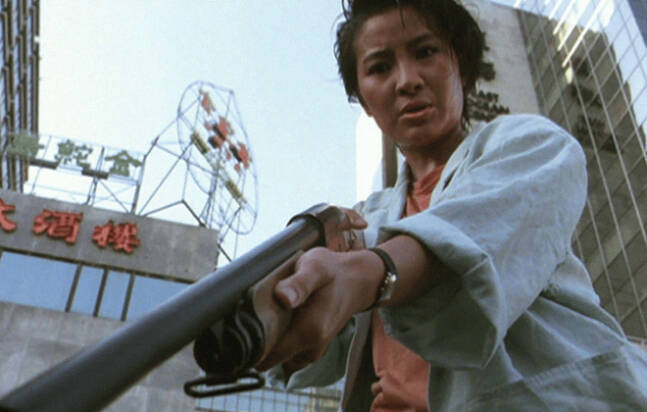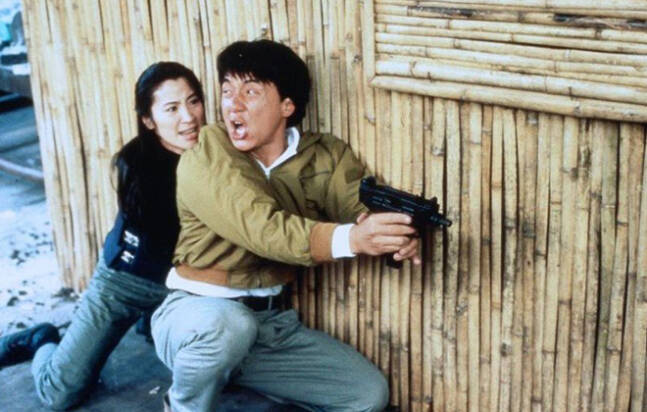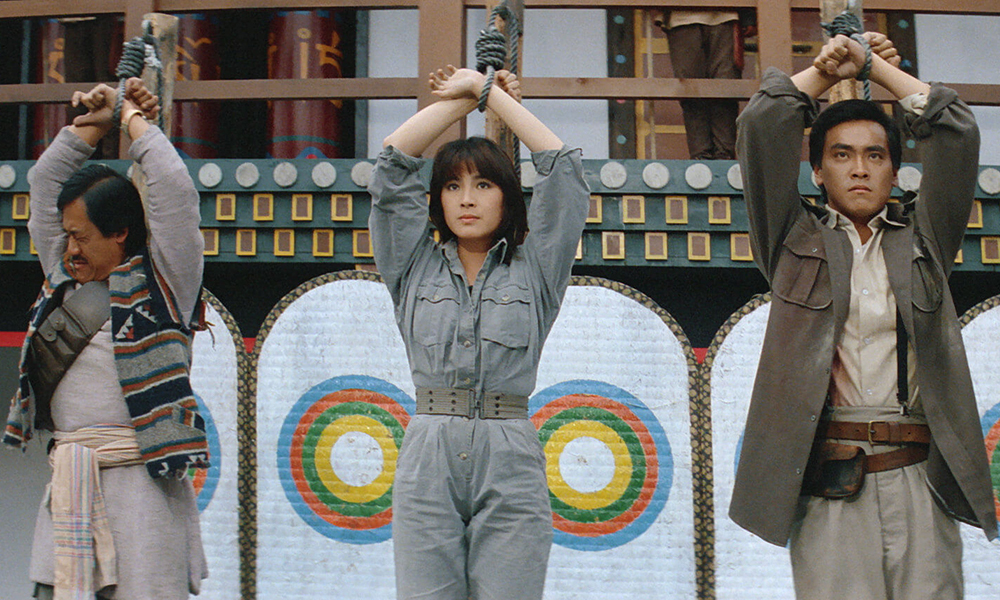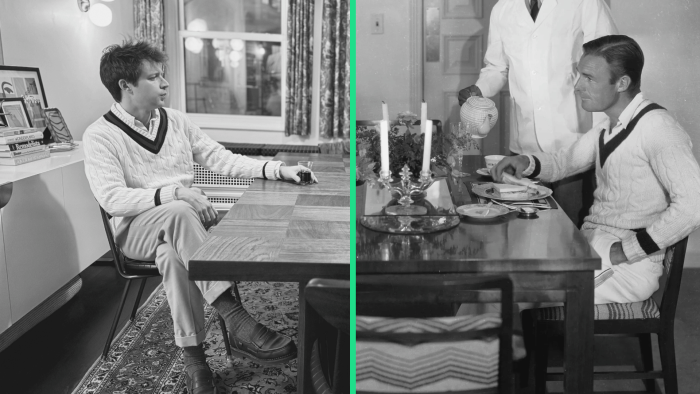Awards hype is rarely worth your time and bother. Even when pundits and PR machines pick the right nominees, they’re still wrong for treating them like race horses. For the 2022-23 season, the awards committees have outdone themselves by churning out a particularly oxymoronic narrative around the year’s most celebrated talent: The luminous Michelle Yeoh, dancer by background, martial arts royalty by trade, a megastar without whom action cinema simply wouldn’t exist as we understand it today.
Attending the many breathless articles that make up Yeoh’s 2023 media profile feels like whiplash: If you read them without any background on career, you’d be blameless for assuming she hasn’t tasted success in 40 years of immortal screen performances, and that Everything Everywhere All at Once, the surrealist action comedy family drama multiverse bizarro flick by Daniels (the joint nom de plume of super dude directing team Daniel Kwan and Daniel Scheinert), is her first chance at cementing her iconography. Coverage too often leans on phrases like “long overdue” and “finally being recognized.” The implications of word choice suggest that Yeoh has languished in obscurity since the 1980s, and that it took Daniels directing the Oscar nominee to make her a star.
There’s truth buried in the exaggeration. Yeoh has not, of course, been nominated for an Academy Award for any of her better recognized and more visible roles: Not Crazy Rich Asians, not The Lady, not Memoirs of a Geisha, and not even Crouching Tiger, Hidden Dragon–the last of these being the most baffling as a 10-award nominee in 2001. (Note: If there is a theater near you still running the film’s recent 25th anniversary re-release, stop reading this, buy a ticket, watch it, then come back and finish reading this.) A presumable pack of fools encouraged her to retire before she landed the lead in Everything Everywhere All at Once. Most of all, she’s leading the charge in a year where Asian representation is at an historic high in the Academy of Movie Arts Pictures and Sciences (AMPAS) annals. Framing Yeoh’s Best Actress nomination as a major victory, given this context and given her own struggles in the industry, is correct and just.

“Yes, Madam” (1985)
At the same time, Yeoh has a jaw-dropping count of bangers and all-timers under her belt, ending with Everything Everywhere All at Once and beginning with Yes, Madam, Royal Warriors, Magnificent Warriors, and Police Story 3: Super Cop, ballooning into 1993 with four roles that include The Heroic Trio and Executioners. This is a decade into Yeoh’s filmography. If she’d hung up her ass-kicking boots and called it good, she would still be deserving of legendary status, both in action cinema’s broader topography and in martial arts filmmaking. Without Everything Everywhere All at Once, she would still be Michelle Yeoh, an established great whose name is worthy of the same respect given to Jackie Chan, her long-time friend and longer-time “male chauvinistic pig,” to Donnie Yen, to Bruce Lee.
So there’s a layer of condescension, though admittedly unintended, baked into critics’ hosannas. Yeoh’s moment is long overdue according to whom? What moment are we talking about here? The moment where she’s lifted to mainstream relevance by an institution the mainstream doesn’t pay attention to, and which has bluntly ignored the efforts and contributions of minorities decades and then some? Is this what is meant by recognition? It’s off-putting, seeing Yeoh’s work incidentally compressed down as small potatoes by the people championing her. Frankly, her likely victory in the Best Actress category will mean more for other Asian talent in future ceremonies than it will for her.
It’s not that taking home the trophy wouldn’t be meaningful for Yeoh. She faces stiff competition in Cate Blanchett. (And only Cate Blanchett. Michelle Williams is a pass, Ana de Armas is terrible in Blonde, and Andrea Riseborough is just lucky the Academy didn’t pull shady industry scumbaggery to repeal her nomination.) But boiling down her irrepressible screen presence and long years of action movie eminence to the moment where AMPAS has finally decided to honor her is frustrating. All of the big brain talk about her overshadows any analysis of her performance in Everything Everywhere All at Once, too, which is shaped in large part by her myriad other performances in other films.
In Everything Everywhere All at Once, Yeoh plays Evelyn. She is struggling through middle age, her marriage to her husband Waymond (Ke Huy Quan), her relationship with her daughter Joy (Stephanie Hsu), and her laundromat’s imminent IRS audit courtesy of inspector Deirdre (Jamie Lee-Curtis). Evelyn is, by the movie’s own admission, nothing special. Her nothing-specialness makes her the perfect savior when the multiverse comes under threat by Jobu Tupaki, Joy from another universe, bent on destroying the multiverse and ending life as we know it. Evelyn is given technology to access her other selves in other universes, and all of their skills and talents, and entrusted with the task of defeating Jobu.
It gets weird. It is weird. And awesome, and original, and inventive, and moving, and Yeoh, like Evelyn, calls on her past selves–her characters in movies like Crouching Tiger, Hidden Dragon; Crazy Rich Asians; Butterfly and Sword; The Heroic Trio; and the list goes on–to construct Evelyn in all her failure and unrealized glories. As such, it can’t be said that she is “finally” receiving her moment or “finally” getting recognition. If this is the role that she was destined to be recognized for, after all, then it follows that Yeoh needed the time necessary to play it.

“Police Story 3: Supercop” (1992)
In the interim, she has contented herself whupping bad guys left and right, earning status and amassing a global following. The Criterion Channel, where every manner of film movement across the medium’s history is in due time given a spotlight, has a selection of her movies on streaming leading up to the Oscars on March 12th. 88 Films US, one of the top purveyors of S-tier action cinema, released its lovingly tended Magnificent Warriors Bluray a couple of weeks ago, and will drop Police Story 3: Super Cop in April. Watching Magnificent Warriors on Criterion is nice. Watching the 88 Films disc is twice as nice, as it’s spotless and gorgeously restored in 2K from the original negative, and also packing subtitles for the lovable Richard Ng Yiu-hon’s ending speech about compassion over animosity.
Of course, you’re going to watch Magnificent Warriors for Yeoh (credited as “Khan,” as with all of her early movies), ultra capable, perfection in motion, the whipmaster before Bill Murray and SNL made their skit in 1993. And you’re going to watch Everything Everywhere All at Once, if you haven’t already, as the pinnacle to date of Yeoh’s career. But don’t watch Magnificent Warriors–or Yes, Madam, her true breakout role–merely as means to the end of Yeoh’s Oscar nomination. These movies aren’t building blocks to something better. They’re classics. Treat them, and Yeoh, accordingly.




